Grouper, snapper among species that benefit
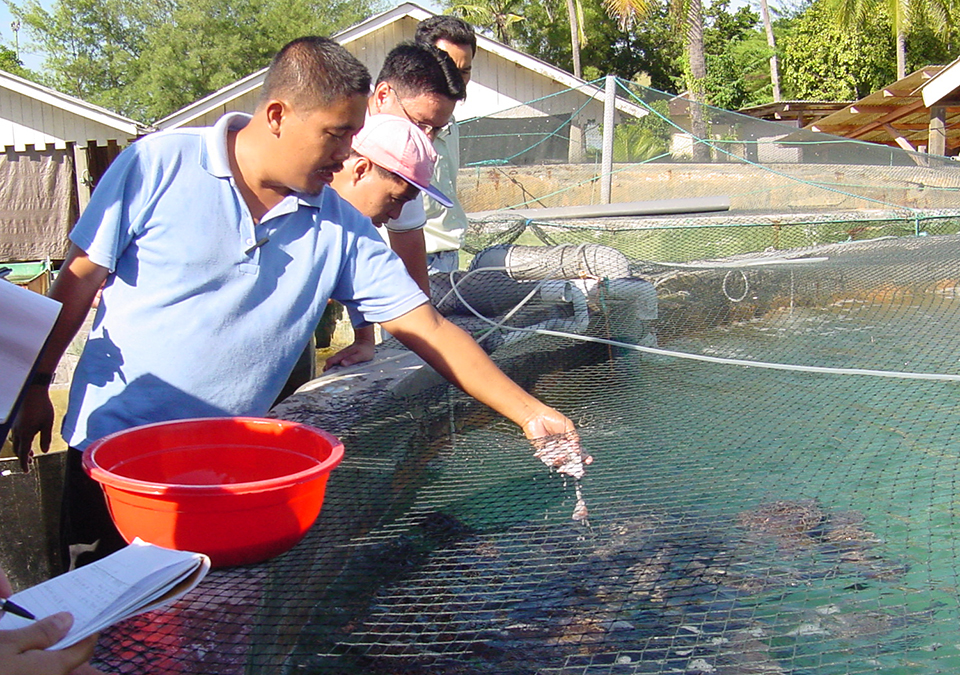
A well-attended regional workshop held in Malaysia in 1996 was the starting point for an initiative to promote cooperation in marine fish aquaculture in the Asia-Pacific region. “Aquaculture of Coral Fishes and Sustainable Reef Fisheries” – organized by the Network of Aquaculture Centres in Asia-Pacific (NACA) and hosted by the Department of Fisheries, Sabah, Malaysia, with participants from throughout Asia and the Pacific – identified a number of constraints to marine fish farming in the region and recommended improved communication and strengthening of research cooperation to address these constraints.
Asia-Pacific Grouper Network
A regional program was drafted during 1998 with support from the Australian Centre for International Agricultural Research (ACIAR), and the Asia-Pacific Grouper Network (APGN) was formed as a mechanism to facilitate cooperation in grouper aquaculture. Coordinated by NACA, the network has been supported by the Asia-Pacific Economic Cooperation (APEC) through the Fisheries Working Group.
Asia-Pacific Marine Finfish Aquaculture Network
APGN made substantial progress in supporting research and development in grouper aquaculture, and recently Asian government representatives at NACA’s 13th Governing Council Meeting in Langkawi, Malaysia decided to absorb APGN into the core NACA program. They further recommended expansion of network activities to include other marine finfish species and ornamental fish from coral reef areas. This expansion led to the birth of the Asia-Pacific Marine Finfish Aquaculture Network in 2002.
Objectives
The overall objective of this network is to support the development of environmentally and socially responsible, and economically viable marine finfish aquaculture in the Asia-Pacific region through:
- Improving the coordination of research to reduce overlap and duplication of efforts.
- Providing opportunities for collaborative research in marine fish farming.
- Improving communication and information exchange within the marine finfish aquaculture industry.
- Supporting capacity building and technical exchanges.
The upgraded network website, http://www.enaca.org/grouper, now provides more comprehensive coverage of marine fish aquaculture in the region and a means to exchange and disseminate information.
Sustainable livelihoods
Since starting, the network has given particular attention to the development of marine finfish farming that provides employment and contributes to sustainable livelihoods for coastal people, particularly fishers living in coral reef areas. The focus reflects a concern among APEC, ACIAR, and NACA to explore cultured supplies of grouper and other coral reef species as a contribution to help protect endangered reefs and reef fish from the pressures of illegal fishing practices. The intention is to ensure that new aquaculture livelihood options and investments provide economic benefit to a diversity of stakeholders.
So far, considerable attention has also been directed toward improving the hatchery production of key grouper species to reduce the current reliance on wild-caught fingerlings for aquaculture purposes. The capture of wild juveniles is in many cases unsustainable, and sometimes carried out using destructive fishing techniques which can have significant impact on the long-term status of reef fish stocks. Attention is now shifting to other issues, such as improving the sustainability of grow-out farms and looking at feed alternatives to the widely used trash fish.
Partnerships
The network is not limited to researchers, but has and will continue to establish partnerships with the private sector. Commercial sector participation in the research and development activities of the network is particularly welcome.
Structured research program
A structured research program developed through consultation during 1998 has successfully guided the research activities of the network through 2003. The status of the research program was reviewed at a workshop in Ha Long, Vietnam, in October 2002. The workshop led to revisions that address the wide range of issues that currently constrain the development of marine fish aquaculture in the Asia-Pacific region.
Research program elements
The research program addresses the following elements:
- Production technology for broodstock, larviculture, nursery, grow-out, and postharvest.
- Environmental issues, particularly management of environmental impacts and transition to more sustainable practices.
- Marketing and trade.
- Food safety and certification.
- Socioeconomics and coastal livelihoods.
- Fish health and disease control.
- Training and extension services.
Project support
To date, the network has supported several collaborative projects. For example, ACIAR project FIS/97/73 (http://www.enaca.org/aciar) focused on improving larval-rearing techniques and developing cost-effective grow-out diets. Among the outcomes of this project:
- Improved larval survival, from 1 to 5 percent at the beginning of the project to current figures of 30 to 50 percent from newly hatched larvae to metamorphosis.
- Improved knowledge of grouper larval biology and physiology, including identification of the optimal environmental conditions for prefeeding larvae and a detailed assessment of the development of the digestive system and digestive enzymes.
- Development of grow-out diets for groupers that emphasize locally available ingredients.
- Demonstration of the capacity of groupers to utilize protein sources other than fishmeal, particularly high-quality terrestrial meat meals.
Cooperative efforts
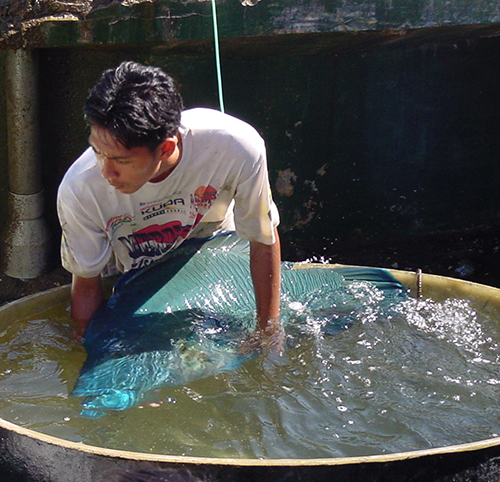
APEC funded several complementary studies, including those on the sustainability of wild grouper fry/fingerling collection, fish health and grouper viral disease control, and socioeconomic issues associated with the transition of fishers from destructive fishing to aquaculture. In addition, APEC has encouraged and supported personnel exchanges to develop cooperation on network projects, including some highly productive public- and private-sector exchanges.
Close cooperation has also been engendered with the nongovenmental organization community. The Nature Conservancy in Indonesia is developing a sustainable marine finfish aquaculture project to supply demand for coral reef fish, and a new initiative with the International Marine Life Alliance and others for development of aquaculture standards as part of an industrywide project entitled “Developing Industry Standards for the Live Reef Food Fish Trade.”
New initiatives
Participants in the Ha Long workshop recognized the need for further attention to the environmental management of marine fish culture, and livelihoods and trade, while maintaining the excellent technical cooperation and training initiatives that had been undertaken. In response, NACA, ACIAR and other partners are working toward new initiatives. The Developing Industry Standards for Live Reef Food Fish Trade project has highlighted the need to strengthen the network – which so far has concentrated on the supply side – to explore the marketing and demand-side issues associated with marine fish aquaculture in the region.
Collaborative activities
Several aspects of the program would benefit from increased emphasis and additional collaborative research activities. The network will therefore continue to promote collaborative activities where researchers, industry, NGOs and other stakeholders cooperate in identifying and implementing research and development activities for responsible marine fish aquaculture.
Knowledge, extension, training, information exchange
NACA is cooperating with several network partners on training and extension services, and an active collaborative training program is developing.
Information on marine finfish aquaculture is disseminated through the website, a bimonthly electronic newsletter, exhibits, seminars, and workshops. The website also provides a web-based discussion forum which allows users to post questions and share experiences on marine finfish aquaculture. Due to the vast variety of species and culture systems in marine finfish aquaculture, a photo gallery was established to assist in the identification of species and provide users with a brief overview of various culture systems and practices in the Asia-Pacific region. Users are welcome to contribute their images to the site.
Extension of information is also covered using more traditional technologies. The NACA magazine Aquaculture Asia incorporates a Marine Finfish News section that relays news and information on marine finfish aquaculture to readers. Relevant news and articles in the Marine Finfish Aquaculture Newsletter are also disseminated through the Secretariat of the Pacific Community Live Reef Fish Information Bulletin and Fishing Chimes, India.
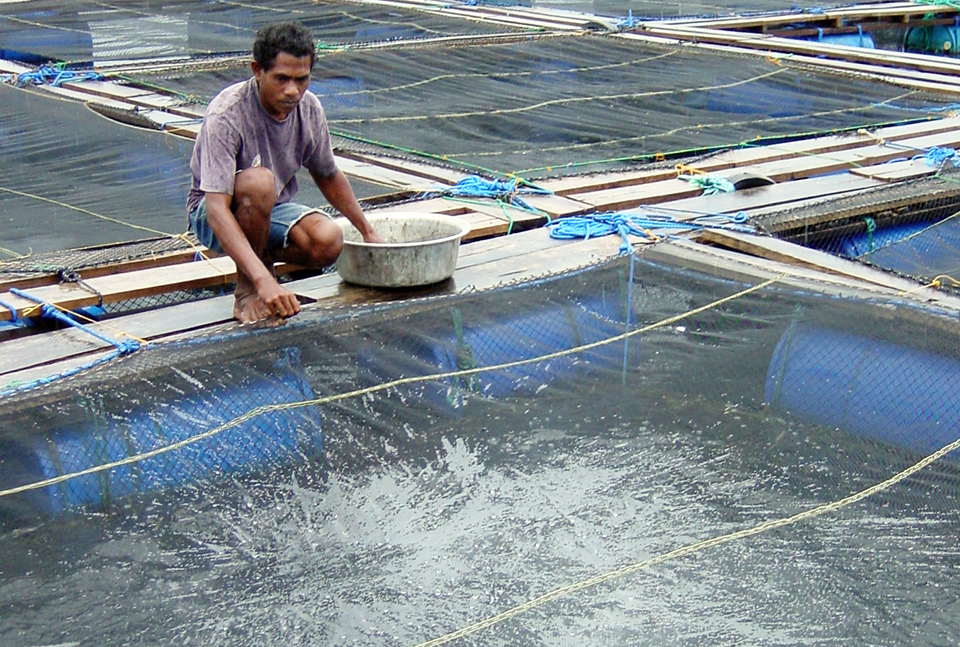
Training in grouper hatchery technology
With recent improvements in grouper hatchery technology, training in hatchery production is now a realistic option for some grouper species. The network successfully organized a Regional Grouper Hatchery Production Training Course in 2002 at the Gondol Research Institute for Mariculture in Bali, Indonesia. The institute, a pioneer in grouper research, is set in a beautiful location on Bali’s north coast and equipped with modern research and training facilities. Course participants from Thailand and Vietnam actively produced grouper fingerlings after returning to their institutes.
The same course will be organized May 1-21, 2003 at the institute. A new Study Program on Marine Finfish Aquaculture and Markets in Southern China and Hong Kong is also being planned for June 2003.
Coral reef fishing
The network is also concerned with ensuring that research findings are communicated and effectively used in regional efforts to transform the destructive practices that accompany some forms of coral reef fishing to a more sustainable means of supply. In 2002, a special study commenced to understand the issues and practices associated with shifting poor coastal fishers from destructive fishing to more sustainable harvesting and culture practices. Further studies on such issues are planned for 2003, and the network is involved in a related initiative to develop standards for a responsible live reef fish trade.
Future directions
In the future, the network will continue to promote information exchange and active engagement of the commercial sector and other stakeholders. Further partnerships with governments, the private sector, and NGOs will be explored as part of a concerted Asia-Pacific regional collaborative effort to address unsustainable fishing practices and poverty in coastal areas, and support development of responsible marine fish aquaculture.
(Editor’s Note: This article was originally published in the February 2003 print edition of the Global Aquaculture Advocate.)
Now that you've reached the end of the article ...
… please consider supporting GSA’s mission to advance responsible seafood practices through education, advocacy and third-party assurances. The Advocate aims to document the evolution of responsible seafood practices and share the expansive knowledge of our vast network of contributors.
By becoming a Global Seafood Alliance member, you’re ensuring that all of the pre-competitive work we do through member benefits, resources and events can continue. Individual membership costs just $50 a year.
Not a GSA member? Join us.
Authors
-
Michael Phillips, Ph.D.
Network of Aquaculture Centres in Asia-Pacific
Suraswadi Building
Department of Fisheries
Kasetsart University Campus
Ladyao, Jatujak, Bangkok 10900 Thailand[103,114,111,46,97,99,97,110,101,64,115,112,105,108,108,105,104,112,46,108,101,97,104,99,105,109]
-
Sih Yang Sim
Network of Aquaculture Centres in Asia-Pacific
Suraswadi Building
Department of Fisheries
Kasetsart University Campus
Ladyao, Jatujak, Bangkok 10900 Thailand -
Mike Rimmer, Ph.D.
Department of Primary Industries
Agency for Food and Fibre Sciences – Fisheries and Aquaculture
Northern Fisheries Centre
Cairns, Queensland, Australia
Tagged With
Related Posts

Responsibility
A look at integrated multi-trophic aquaculture
In integrated multi-trophic aquaculture, farmers combine the cultivation of fed species such as finfish or shrimp with extractive seaweeds, aquatic plants and shellfish and other invertebrates that recapture organic and inorganic particulate nutrients for their growth.
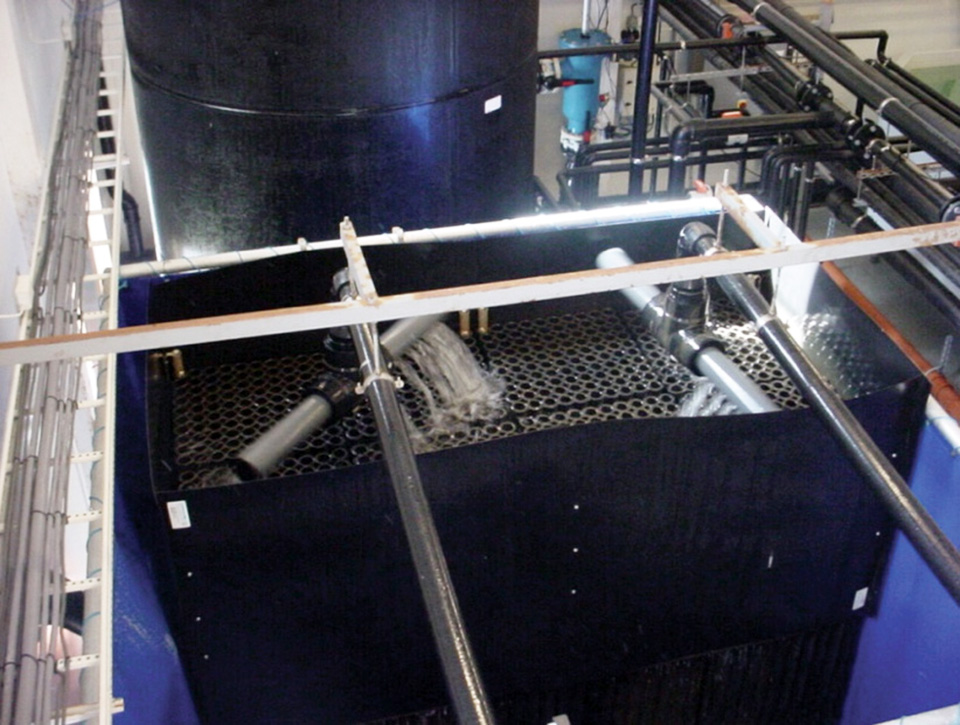
Innovation & Investment
A review of unit processes in RAS systems
Since un-ionized ammonia-nitrogen and nitrite-nitrogen are toxic to most finfish, controlling their concentrations in culture tanks is a primary objective in the design of recirculating aquaculture systems.
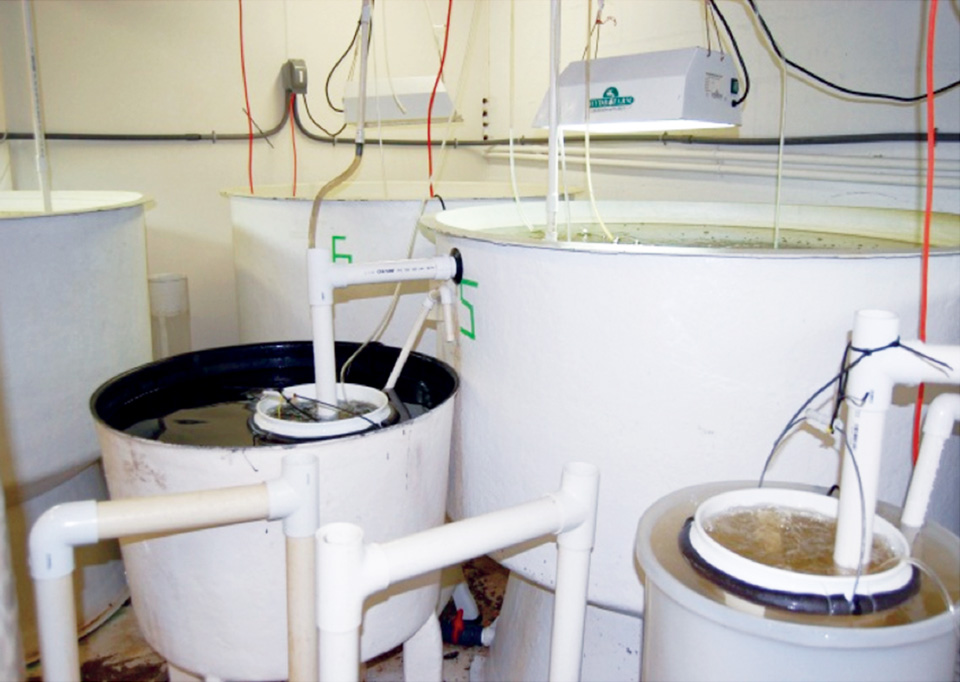
Health & Welfare
Advances in intensive copepod production technology
Research at the Oceanic Institute has been successful in overcoming bottlenecks associated with rearing small-mouthed fish larvae by finding a suitable first feed. Early work on the calanoid copepod Parvocalanus crassirostris focused on parameters necessary for successful maintenance of stock cultures.
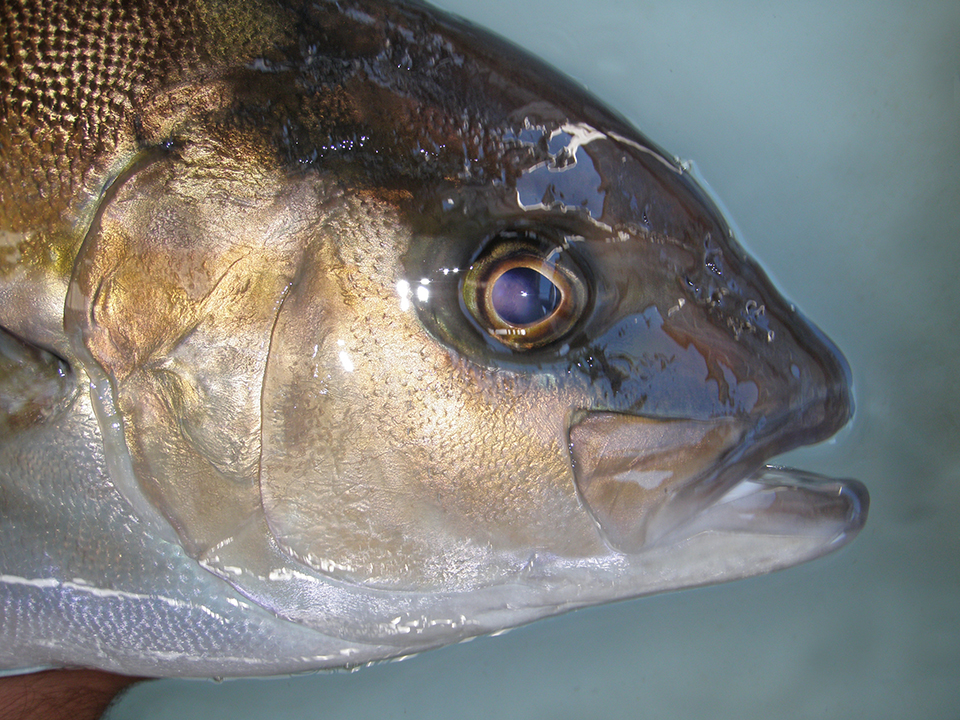
Health & Welfare
Advances in yellowtail larval rearing
The University of the Canary Islands in Spain is researching yellowtail broodstock management and larval rearing to promote aquaculture diversification in Europe.



